Got (the healthiest) Milk?
This post may contain affiliate links. As an Amazon Associate, I earn from qualifying purchases. Please read my disclosure.
There’s so much controversy over dairy these days.
One camp claims that milk (and all dairy) is one of the worst foods you can eat and should be avoided at all costs, while others claim that if you’re not lactose intolerant, and you have access to organic, pasture-raised dairy – that there is no harm in drinking milk in moderation.
And now there are so many milk alternatives out there it’s hard to keep track: soy, almond, coconut, rice, hemp, oat – who can tell the difference? And how do you know which one is the best / healthiest milk for you?
That’s where this post comes in. This is your guide to all of the milk and milk alternatives out there – to help find the healthiest milk for you!
If you’re enjoying milk, you’re probably using it with cereal on occasion. Be sure to check out my guide on the 20 Healthiest Breakfast Cereals.
Let’s start with the basics: Regular Cow’s Milk
a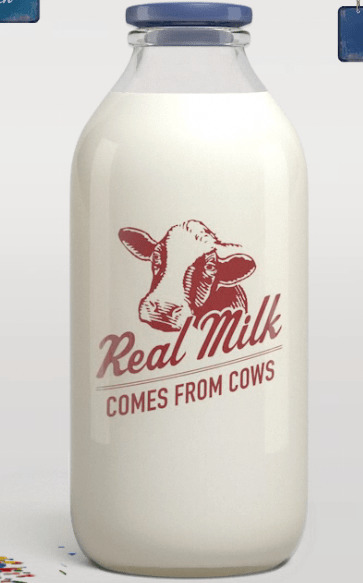
The Facts:
- Your options include: 0% (Skim/Fat Free), 1%, 2% or Whole Milk
- There is organic (pasture raised), organic (grain fed), and non-organic milk
- The calories (per 8oz glass): Whole Milk has about 150 Calories and 8g Fat. 2% has 125 calories and 5g fat. 1% has 100 Calories and 2.5 g Fat. Skim has 80 Calories & 0g Fat.
- The sugar: All the sugar in plain milk is natural (lactose), so there’s no sugar added
- Flavored milks should be avoided at all costs: Chocolate, strawberry, and other flavored milks (including vanilla) have tons of sugar – sometimes as much as a can of Coke.
- Non-organic milk comes from cows that are fed hormones and antibiotics, and those cows ingest pesticides from non-organic feed — and all of that ends up in non-organic milk. (source)
What does regular cow’s milk offer you? Per 8oz glass you get: 8g protein and tons of nutrients — 30% of your daily value (DV) of calcium, 25% DV vitamin D as well as potassium, phosphorus, vitamin A, vitamin B12, riboflavin, and niacin. Dairy from organic, pasture-raised cows has been shown to have a better omega-3 to omega-6 fat ratio, higher levels of beneficial fats such as CLA, and more antioxidants. (source)
The Bottom Line: There isn’t one answer that can apply to everyone when it comes to milk. If you aren’t lactose intolerant, if you don’t have digestive issues, and if you enjoy milk – drinking it in moderation is fine. Choose organic pasture raised, 1%, 2% or whole milk (because a little bit of fat is good for you). Personally: I’ve never had any issue with milk and I enjoy it, so I add organic, pasture raised 1% milk to my oatmeal and to my tea every day (about 1/2-1 cup total per day).
Soy Milk
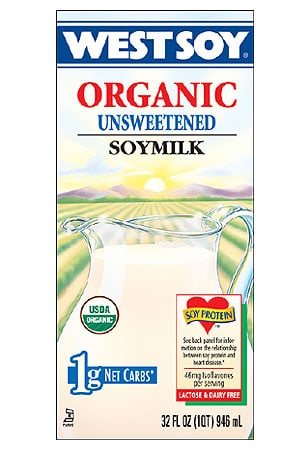
The Facts:
- Soy in this country is one of the main sources of GMOs, so organic soy is always the way to go. (source)
- There are too many versions and brands of soy milk to list. There’s light, sugar-free, organic, etc. This can get very confusing.
- Most soy milk brands have too much added sugar (up to 12g per 8oz!) and preservatives/thickeners like carrageenan – which should be avoided.
- The best soy milks have two ingredients: whole organic soy beans and water.
- Soy contains endocrine disruptors – and studies are inconclusive over whether soy is harmful or not. (source)
 The Facts:
The Facts:- Many points above about soy milk apply to almond milk: there are many options (light, unsweetened, flavored) and most brands have too many preservatives and thickeners (e.g. carrageenan) and sugar added (up to 12g per 8oz).
- Almond milk has virtually no protein (only about 1g per 8oz). So if you’re looking for a protein packed alternative to milk, this isn’t it.
- Unsweetened Almond milk can be a very low calorie alternative to regular milk as long as you’re getting your protein elsewhere.

- Many points above about soy milk apply to rice milk: there are many options (light, unsweetened, flavored) and most brands have too many preservatives and thickeners (e.g. carrageenan) and sugar added (up to 12g per 8oz).
- Rice milk has virtually no protein (only about 1g per 8oz).
- Rice milk is considered the least allergenic of all the milks since it’s dairy and nut free
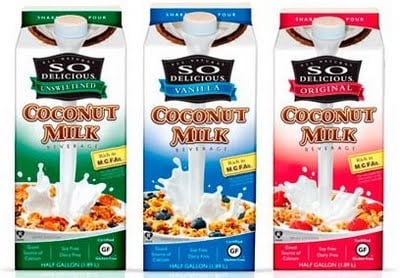
- Many points above about soy milk apply to coconut milk: there are many options (light, unsweetened, flavored) and most brands have too many preservatives and thickeners (e.g. carrageenan) and sugar added (up to 12g per 8oz).
- Coconut milk has one of the highest saturated fat amounts per serving (out of all the milks)
- Coconut milk is dairy, soy, nut free
- This milk has virtually no protein – 1g per 8oz serving
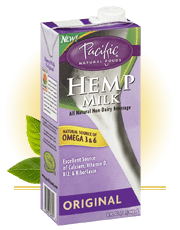 Things to remember:
Things to remember: - Hemp milk is lower in sugar but higher in fat than the other milk alternatives
- Hemp milk (depending on the brand) does have some protein: more than almond/coconut/rice but less than soy/regular milk
- Watch out for added sugars and preservatives/thickeners (carrageenan)
- Hemp milk offers a well-balanced ratio of omega-3 and omega-6 essential fatty acids
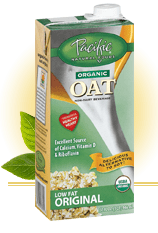 Things to remember:
Things to remember:- This is the highest calorie milk option – 1 cup has 130 calories
- Many points above about soy milk apply to coconut milk: there are many options (light, unsweetened, flavored) and most brands have too many preservatives and thickeners (e.g. carrageenan) and sugar added (up to 19g per 8oz).
- Oat milk is lactose free



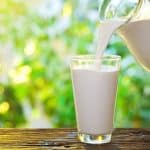







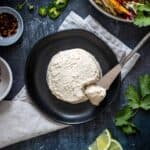


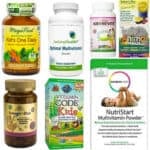
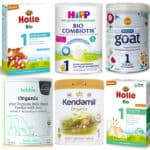



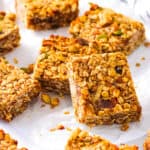




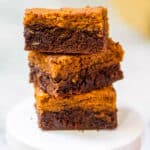






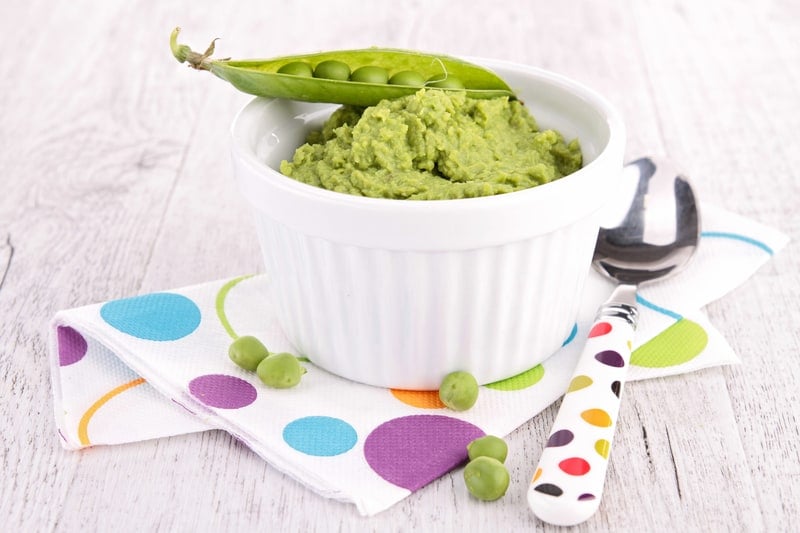



Thanks for writing (and reposting) this thorough, balanced look at the milk options! Nobody in my family has a dairy allergy, so we have stuck with cow’s milk, although we’ve tried all the others (except oat milk) at some point just out of curiosity. I like coconut milk very much, so I think if I ever had to cut out dairy, that’s what I would use in my coffee and baking in place of fluid milk. (What I would really miss is cow’s milk yogurt!!)
Here’s my reasoning about what type of cow’s milk to buy. Sometimes when I look at the milk department in the supermarket, I boggle at the contrast to my childhood, when the store carried one brand of cow’s milk in two sizes of package and three levels of fat, and one brand of buttermilk, and that was that!
Thanks Becca! I’m glad you found this post helpful! I’m with you — if I had to cut out dairy altogether I’d miss cow’s milk and cheese too! I enjoyed reading your post – I think you and I are pretty aligned on how we think about the cow’s milk we buy 🙂 Thanks for sharing!
This is a very useful article. I’m lactose intolerant so I substitute cow’s milk with almond milk but after reading your post, I realized I may have to switch to oat milk as it contains more protein than almond milk.
Thanks Calvin! So glad this post was helpful for you to find a more protein-packed milk option!
Awesome post! It’s great to have such an informative look at the options out there as far as milk is concerned. I hadn’t known hemp milk was a thing, for example – guessing it won’t be available in my area anytime soon, though! Will have to try some of these other options!
Thank you so much Jordan! I’m so glad you found this post helpful – I hope one of these options works out well for you!
What about coconut milk? I would like to know about it and how beneficial it would be. It’s really easy to make at home and wanted to know more about it. I really appreciate you sharing your expertise with us and its very informational and helpful. Thank you!
Hi Rekha! As I mentioned in the post, unsweetened, light coconut milk is great in curries, Indian dishes, etc. – and it does have nutritional benefits in that it is high in Vitamin D and B12. It doesn’t have any protein though, so if you’re going to replace regular milk with coconut milk you will need to add some protein to your diet from another source. Homemade coconut milk is better than what you can get at the store – definitely make it at home if you enjoy doing that! If not, there are some good options at the store that are all natural, have no carrageenan, are unsweetened, and lighter in calories/fat than the regular version. Glad you found this post helpful – let me know if you have any other questions!
This was such an informative post! I’ve never noticed an issue myself when it comes to drinking regular cow’s milk, and I really like the taste. I used to drink probably too many glasses of the low-fat variety in the past, but I’ve since begun drinking a lot more almond milk. I usually just have this in my oatmeal for breakfast, and rarely will you see me drinking milk by the glasses anymore. I’m glad you mentioned the protein difference between cows and almond milk; although I am aware of my protein amounts throughout the day it’s good to know that the protein I may have been getting when drinking cows milk I am no longer getting in the almond. Thanks!
Thank you so much Haylie! I’m just like you – you won’t find me just drinking a plain glass of milk, but I do love it in my oatmeal and tea. Almond milk is great if you can find an unsweetened version without carrageenan – but yes definitely try to make up the protein you’re missing in some other way 🙂 I’m so glad you found this post helpful!
This was a great article. In my opinion, cow’s milk should have the only rights to the word MILK – the others should have an alternative word instead of milk – like “Almond Beverage”!
Thanks Marilyn! Fair enough 🙂
I know I’m replying to an old post; but I’ve been doing a lot of research on milk. I’ve been doing a lot of research on milk and I ran across your blog. I can’t wait to look over all of your recipes and my family is on a mission to live a healthy lifestyle without giving up great tasting food. Have you ever looked into raw milk (cow or goat). When I first started reading about it; I thought it sounded strange, but I truly believe that it’s a valid option. The enzymes and bacteria that are killed during pasteurization and homogenization are extremely beneficial for humans. Even the natural fat that is present in natural raw milk has benefits. I also think that you have to be careful with nut milks because many of them are owned and distributed by large corporations and they lace the nut milks with chemicals; even some that claim to be organic. Read the labels closely. Anyway, I just wanted to see what you thought.
Hi Parker! Thanks for reaching out to me! I have looked into raw milk and I’ve read a lot of the same articles about how raw milk might be beneficial. However, I have also read a bunch of opposing articles around the dangers of drinking raw milk, especially if you don’t know where it’s coming from. A happy medium I’ve found is to drink non-homogenized, organic milk (not raw). That way at least you get the benefits of it being non-homogenized without having to worry about any residual bacteria from raw milk. Another alternative is to buy raw milk, but then boil it at home before you drink it. I completely agree with you about nut milks. It’s SO important to read the labels with great scrutiny, because there are all kinds of sugars, preservatives and additives that are added to some brands – so you have to pick and choose your nut milks carefully. Or, you can make them at home 🙂 Hope that helps! Let me know if you have any other questions or thoughts!
Hi, I know this is an old post but I’m just reading it now, and I have to just thank you because I’ve been looking everywhere for this kind of comparison, and you did a great comprehensive job. Thanks!
Hi Allison! I’m so happy you found this post helpful!! I’m glad the comparisons and information made sense to you – that’s exactly what I was hoping to achieve with this post. Thanks for letting me know!
My father has krones disease and I am prone to heartburn. Almond milk was suggested to me because it is supposedly easier to digest than dairy milk. There may be something to this as I have noticed less heartburn after breakfast. We have two small children, one of which loves the almond milk while the other will only put dairy milk on her cereal.
Sorry to hear about your father – one of my friends has Chron’s disease and I know it’s not easy to live with! Almond milk is definitely easier to digest – I’m glad that it’s been beneficial for you! Be sure to get Unsweetened Almond Milk – that way you get all of the nutrients without any of the added sugars 🙂
Milk choices are so overwhelming! Know anything about the hormones from soy milk?
So the whole soy protein-estrogen debate is a bit up in the air. Soy protein contains estrogenic compounds, but it’s unclear whether this is hurtful to the body or beneficial to it (there are contradicting stories). I try to stay away from soy protein isolate – because that’s the most processed form of soy, but if my soy milk is made from whole soybeans I’m generally ok with that. Hope that helps!
Here are two scientific, balanced articles on soy and health:
https://www.cspinet.org/nah/articles/soy.html
https://www.vegfamily.com/health/is-soy-bad-for-you.htm
My personal conclusion is that soy should be organic, not too highly processed, and eaten in moderation. My family eats tofu about twice a month. My ten-year-old son loves edamame as a main dish in his school lunchbox, but he gets it once a week max. We sometimes eat veggie burgers made with soy protein isolate (often not organic) in restaurants, but we’ve transitioned out of buying them to eat at home routinely now that we’ve found some good veggie burger recipes (using other beans and/or nuts). Soymilk is not forbidden in our family, but we don’t have it on any regular basis.
I completely agree! Whenever we do soy, we do it in moderation – about once a week just like you – and we stick to organic, whole soybean products like edamame, tofu, tempeh, and soy milk made with just water and organic soy beans. I also stay away from soy protein isolate and I make my veggie burgers at home too!
Thankyou so much! This is really helpful! I got quite confused by all those alternative milks that popped up in the supermarket. i usually drink cow milk or soy milk and I think I will stick with it.
I’d really need something like this for all the different kinds of coffee drinks, too =P do you have a recommandation as to what to order in a café?
No problem at all! So glad it’s helpful. As for your question about coffee – what I generally stick to is a small (or in Starbucks land – tall) cappuccino with nonfat or 1% milk and a bit of Stevia, or a small/tall latte with 1% milk and a bit of Stevia. The first one will run you about 60 calories, the second about 100. And both have no sugar added – just the natural sugars from the milk. All of the fancier drinks at cafes generally have tons of sugar added, and are sometimes made with random mixes, so I try to stay away from that. Tea is good too though – hot tea with steamed 1% milk is one of my favs!
Thanks for a helpful post.
No problem!! Glad you found it helpful!
Thanks for the summary. There’s also lactose-free versions of cow milk.
That’s true! Great point 🙂 Another one to add to the list!
I just started drinking cow’s milk after years of soy, rice, and almond milk.
Oh wow! What inspired you to make the switch?
This is a very informative post, thank you very much! Choice is good, but at some point too many choices get overwhelming; you break it down very clearly here and this is a great reference.
Thanks – I’m so glad it’s helpful!
You should try goat’s milk… it’s the most delicious. (Try Whole Foods). It’s got some positive properties compared to cow’s milk and some people who can’t have cow’s milk can tolerate it (larger globules make it easier to digest).
Ah yes – I’ve heard goat’s milk is good but I’ve never tried it before. I have also heard it’s an acquired taste 🙂 I’ll have to check it out, thanks for the tip!